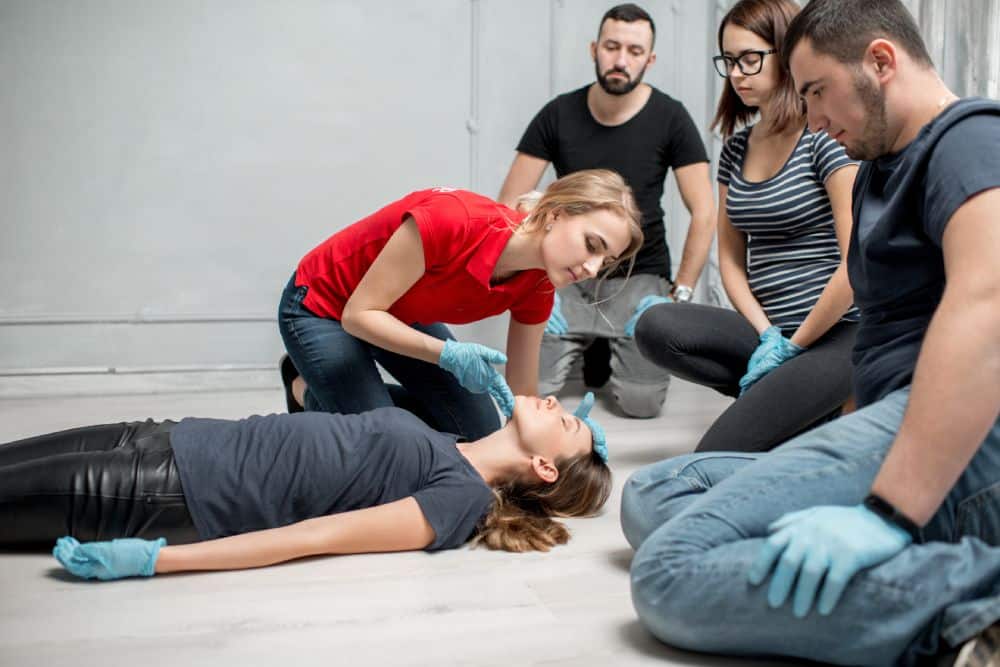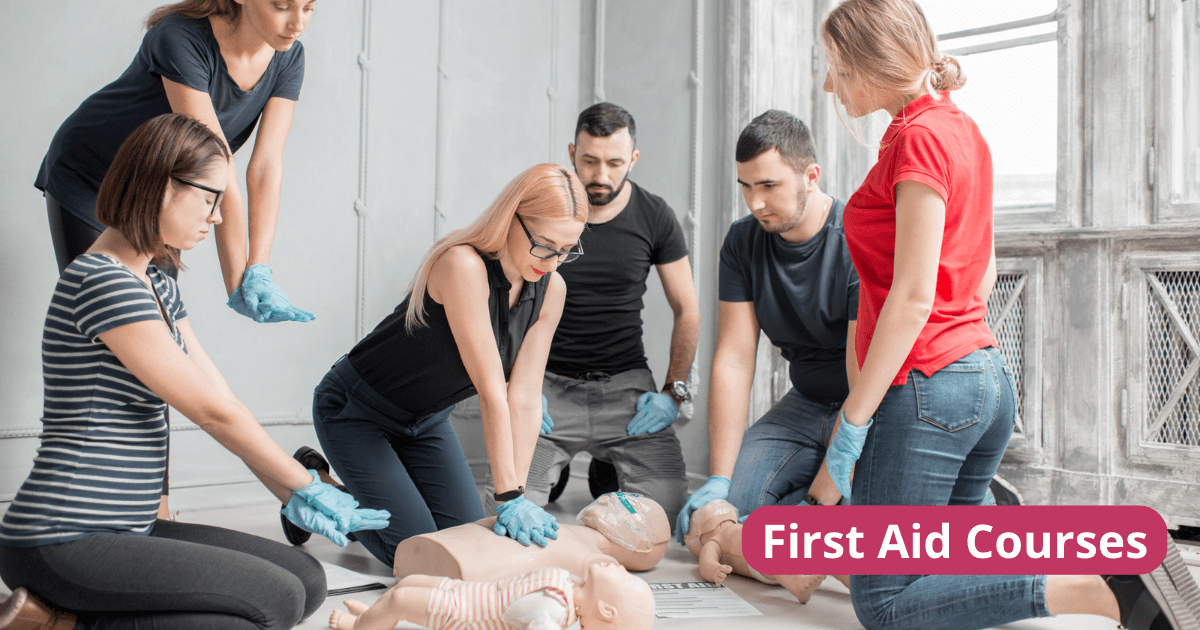Introduction
In today's fast-paced world, the value of being prepared for emergencies can not be overemphasized. Whether you are a parent, educator, or an expert in the health care field, acquiring the abilities to help in medical emergencies is important. This is where first aid courses entered play, specifically those that focus on CPR (Cardiopulmonary Resuscitation) techniques. While private training offers its own advantages, team training in emergency treatment and mouth-to-mouth resuscitation training courses supplies a distinct set of advantages that improve understanding and retention.
This short article checks out The Perks of Team Training in Emergency Treatment and mouth-to-mouth resuscitation Courses, highlighting why this approach can be a lot more reliable than solo knowing. From hands-on method to collaborative learning settings, we will certainly look into numerous elements of group training and how it can improve your experience while acquiring your first aid certificate
What Is Team Training in First Aid and CPR?
Group training refers to instructional sessions carried out with numerous individuals that learn with each other under the advice of a qualified teacher. In the context of emergency treatment and mouth-to-mouth resuscitation programs, this layout permits participants to engage with each other while understanding crucial lifesaving skills.
How Does Group Training Work?
In group sessions, participants generally go through a mix of theoretical knowledge and sensible workouts. The instructor covers vital principles such as:
- Basics of very first aid Techniques for carrying out CPR Use of automated external defibrillators (AEDs) Protocols for responding to emergencies
Participants involve with role-playing circumstances, simulations, and hands-on technique. This interactive environment promotes far better understanding and retention.
Types of Team Educating Available
Group training can take lots of kinds:

- Workplace Training: Business commonly organize emergency treatment programs for their employees. Community Workshops: Neighborhood organizations often hold neighborhood classes. Educational Organizations: Colleges might consist of emergency treatment training as component of their curriculum.
Each setup has its unique benefits that deal with details needs.
The Advantages of Group Training in Emergency Treatment and Mouth-to-mouth Resuscitation Courses
1. Improved Learning Opportunities
Group setups naturally help with conversations that improve understanding. Participants can share experiences or ask questions they might hesitate to voice in individual sessions.
Why is Peer Interaction Important?
Peer communication encourages diverse point of views on taking care of emergencies. As an example, when discussing different types of injuries or clinical crises, various individuals might have experienced one-of-a-kind circumstances that supply important insights.
2. Practical Technique Scenarios
One significant benefit of team training is the opportunity for practical practice circumstances. Individuals can exercise on each various other utilizing manikins or role-play emergency situations.
How Does This Improve Skills?
Practicing in real-time aids solidify methods like chest compressions Look at this website or rescue breaths via muscle memory. The even more comfortable participants really feel performing these activities, the much better prepared they will be during an actual emergency.
3. Building Confidence With Collaboration
When people educate together, they grow a sense of camaraderie that can construct confidence levels significantly.
What is the Link In Between Team Effort and Confidence?
Working as component of a team allows learners to sustain First Aid Course Morphett Vale each other emotionally. If someone has problem with a particular ability-- like applying plasters-- others can action in to provide aid or encouragement.
Psychological Advantages of Group Training
4. Lowered Anxiousness Levels
Anxiety about executing first aid or mouth-to-mouth resuscitation properly can hinder efficiency throughout real-life situations.
How Can Team Setups Alleviate This Fear?
In a supportive group setting, individuals are less most likely to feel separated with their worries; shared experiences typically normalize sensations of anxiousness. Furthermore, practicing together with peers permits them to witness others making errors without judgment.
5. Inspiration Via Shared Goals
Group dynamics usually foster motivation from shared goals.
What Drives this Motivation?
When everyone aims toward making their first aid certifications with each other, people are encouraged to push themselves better than they might alone. This cumulative aspiration fuels commitment among peers.
Cost-Effectiveness of Group Educating Sessions
6. Affordable Solutions for Organizations
For businesses aiming to educate employees in emergency treatment and CPR strategies, team sessions often prove extra cost-effective than individually instruction.
Why is Mass Prices Beneficial?
Many training suppliers supply price cuts for larger teams going to the exact same course at the same time-- making it economically feasible for business targeting at detailed precaution without breaking the bank.
Social Advantages: Networking Opportunities
7. Developing Connections Amongst Participants
Training with each other constructs relationships past simply learning lifesaving abilities; it also promotes networking opportunities amongst area participants or coworkers alike.
How Can These Connections Be Valuable?
Networking within a team develops methods for collaboration in the future-- whether it's establishing workplace safety and security methods or forming local emergency situation action teams after completing their emergency treatment courses.
Accessing Different Learning Styles
8. Catering to Different Knowing Preferences
People find out in different ways; some soak up details ideal with visual help while others benefit from hands-on techniques or acoustic guidelines from instructors.


Can Group Setups Dressmaker Discovering Experiences?
In team setups led by seasoned fitness instructors equipped with different teaching methods-- including videos demonstrating CPR methods-- participants have several sources offered at once catering specifically toward their preferred styles!
FAQs about Team Training in First Aid and Mouth-to-mouth Resuscitation Courses
1. What credentials ought to my instructor have?
Your instructor ought to possess pertinent accreditations from identified organizations such as the American Heart Organization (AHA) or Red Cross in addition to significant training experience!
2. Exists an age requirement for participating?
Most programs accept participants aged 12 years of ages and above; nevertheless, it's suggested always examine in advance considering that different organizations might have details restrictions based on age groups!
3. For how long does it commonly require to finish these courses?
Depending upon the kind picked-- a fundamental program could last around 4-- 6 hours while sophisticated ones might prolong up-to 2 days!
4. Will certainly I obtain a certification upon completion?
Absolutely! Many reliable institutions provide certificates verifying conclusion as soon as you've successfully passed any kind of required analyses assessed by your trainer!
5. Can I take part if I have no prior experience?
Yes! Many individuals enlist without any history understanding since fitness instructors break down concepts right into convenient parts catered towards beginners!
6. Exist refresher courses offered after getting certified?
Definitely! Most companies prompt people re-certify every two years considering that standards develop regularly guaranteeing you stay updated with existing practices!
Conclusion
The benefits stemmed from taking part in team training for first aid and mouth-to-mouth resuscitation training courses are enormous-- from enhanced knowing chances through peer communications down to psychological support fostering confidence amongst students alike! Not only does this collective strategy make getting critical lifesaving skills enjoyable yet likewise ensures all included leave feeling well-prepared should real-life emergencies emerge down-the-line!
If you're pondering whether group-based education matches your requirements best when pursuing an extensive understanding relating to handling urgent treatment scenarios effectively after that look no further-- the proof speaks volumes! So gear up today by registering on your own right into one such program near you; come to be an empowered individual qualified sufficient not just conserve lives but additionally motivate others around you too!